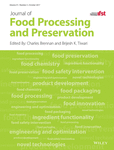Optimization of the Fermentation Conditions to Reduce Anti-Nutritive Factors in Soybean Meal
Abstract
Fermentation using appropriate microorganisms can remove anti-nutritional factors such as protease inhibitor, thus improving the feeding value of soybean meal, a major feed ingredient in pig diet. Two in vitro experiments were conducted to obtain the appropriate conditions for fermentation of soybean meal. Experiment 1 consisted of eight treatments from combinations of two levels of three microorganisms (Bacillus subtilis KC 101, Saccharomyces cerevisiae JM 102 and Bacillus lactis RG 103). Fermentation broth was mixed with soybean meal in 18 L bucket incubated under normal room temperature (averaged 21C) for 10 days. Results of the experiment showed that protease inhibitor activity in treatment with 20 g Bacillus subtilis KC 101 was significantly lower while content of small peptides was higher than those of 10 g Bacillus subtilis KC 101 treatments. Based on results of Experiment 1, the higher level combination of the three microorganisms was selected and incubated with soybean meal in 3 L beaker at 25, 30 and 35C for 7 days in a follow-up experiment. In Experiment 2, protease inhibitor activity on day 5 declined by 93.30, 94.46 and 94.40% in fermented soybean meal, respectively, for the 25, 30 and 35C, and the protease inhibitor activity in the 35C treatment (170.03 TIU/g) was significantly lower than those of 25 and 30C (204.02 and 190.76 TIU/g) (P < 0.05). In addition, free amino acids content in the 35C treatment was the highest. The quantity of Filamentous fungi increased rapidly after day 5 in the 25 and 30C treatments, but the increase occurred only after day 6 for the 35C treatment. In addition, the population of Filamentous fungi was lowest for the 35C treatment. Results of our study suggested that treatment at 35C was most beneficial to improve the quality of fermented soybean meal.
Practical Applications
Soybean meal is the primary protein ingredient in feed industry, but the presence of anti-nutritional factors such as protease inhibitor in soybean meal reduces its feeding value. Fermentation using appropriate microorganisms can remove anti-nutritional factors such as protease inhibitor thus improving the feeding value of soybean meal. Results of our study suggested that treatment at 35C was the most beneficial to improve the quality of fermented soybean meal.




